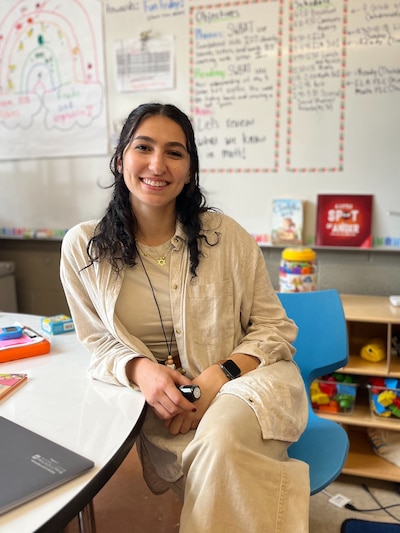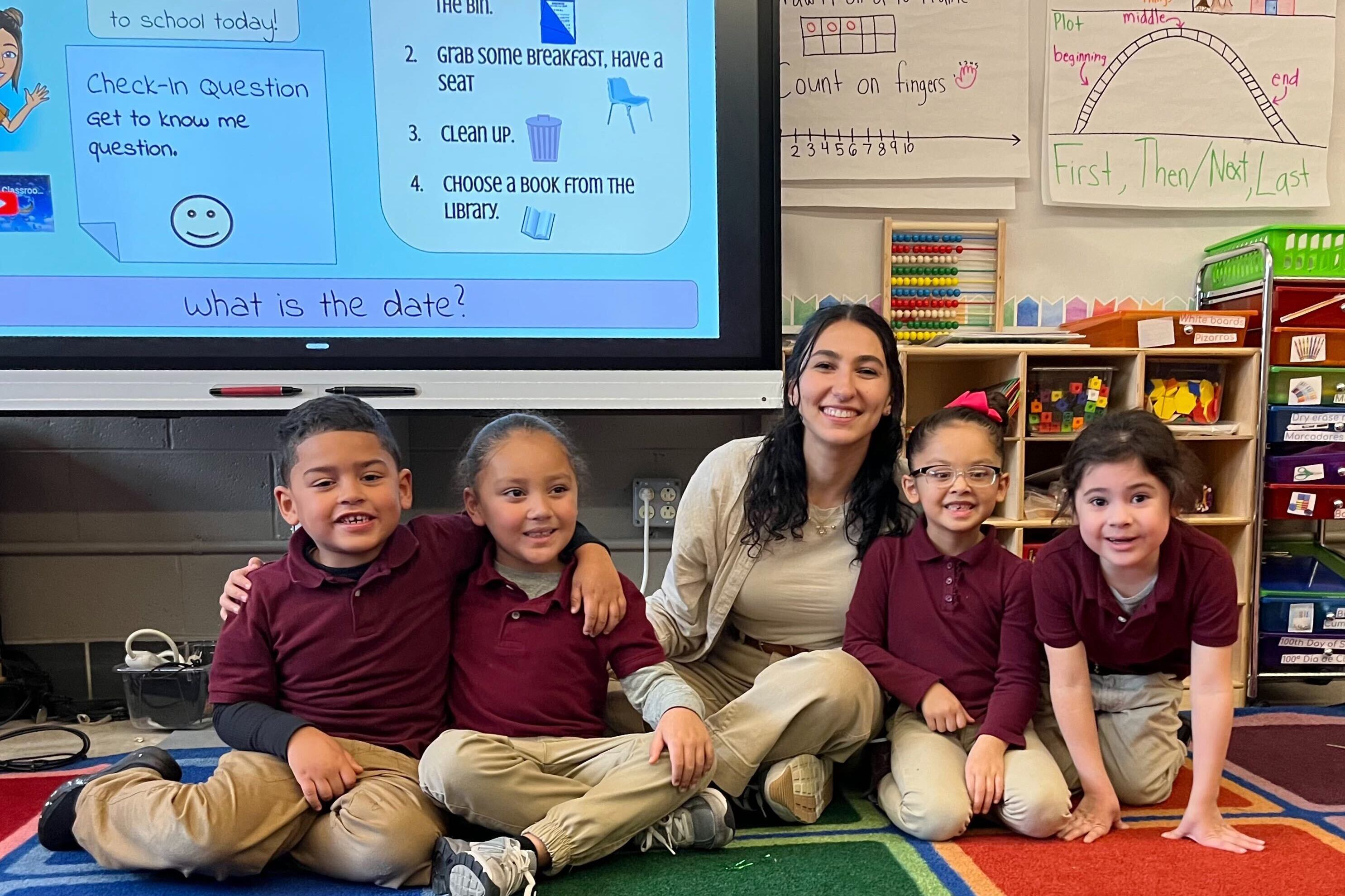During the height of the COVID pandemic, when schools were closing and the future of education was uncertain, Sarah Budlow decided she wanted to become a teacher.
She is now in her third year teaching — her first in the School District of Philadelphia, and she said what she learned in her educator preparation program was simple: “Be prepared for anything.”
“We’ve been virtual, we’ve been in person, we’re not sure what it’s going to look like,” Budlow said was the attitude at the time she graduated in 2020. “We definitely had to have the mindset of, we don’t know what’s going to happen. So you’re just going to have to pivot and figure things out as it goes.”
Budlow is now putting her improvisational skills to work at Luis Muñoz-Marin Elementary School, teaching kindergarten. She regularly sends parents tutorial videos of lessons and skills she’s teaching her students so that they can continue the learning process at home. Because homework is optional in the youngest grade, giving parents the tools to do some extra practice when their kids aren’t in class can be crucial, Budlow said.
Budlow recently spoke with Chalkbeat about joining the educator workforce during the pandemic, getting kids excited about learning, teacher burnout, and her favorite book for early readers.
This interview has been lightly edited for length and clarity.
How and when did you decide to become a teacher?
I graduated college in 2020 with no clue what I wanted to do. I knew that I was interested in urban education and I loved working with kids. I started teaching at an outdoor summer camp with social distancing because of the pandemic.
I was really interested in learning more about urban education and being a part of what goes on in urban schools. That’s when I applied for Teach for America. I’m from Baltimore, but I wanted to go somewhere new, so I asked to be placed in Philly.
Were you daunted about going into teaching during the pandemic?
The more I learned about the impact of a kid’s school experience on their life and their future, the more I was interested in getting involved, especially during the pandemic.
It was kind of good timing because I started teaching in 2021, right when we were coming back from being all virtual. I think that it really highlights just how important it is for kids to be in school. A lot of people would tell me that everything was so different now from what it was before the pandemic, but I have nothing to compare it to. So this is just how it’s always been for me as a teacher.
For the most part, it’s been good to start teaching at a time when I think there’s a lot more appreciation for what goes on in schools.
What’s your favorite lesson to teach and why?
I’m really bad at picking favorites. The first thing that came to mind is math class. The district just started with this Illustrative Math [curriculum], and I love teaching it.
We’ve been learning about counting groups up to 10. There is a lot of room for kids to have conversations with each other and as a whole group about how they counted and why they counted and they can try different ways of counting. It creates this environment in math class where there’s not just one right way to do things. I think it gives them a deeper understanding of what we’re actually doing in math.
I’ve seen kids grow a lot from where they were at the beginning of the year and also just get really excited about math. I hated math as a kid so it’s awesome to be able to not recreate the experience that I had.
My other favorite lesson is any kind of read-aloud. Just asking kids what they think and what they noticed about the characters and getting those conversations going.
One of my favorites that I’m reading with my class today when they get back from lunch is “We Are In a Book!” by Mo Willems. It’s just a lot of fun. Right now I’ll read it to them, but later in the year, they should be able to read it with each other.
What’s something happening in the community that affects what goes on inside your classroom (or your school)?
Kids bring good things and hard things from the community with them. When there’s a holiday coming up, they’re gonna get excited. One of my students’ big sisters just had a baby and he’s an uncle and he was really excited to show me pictures. There are those exciting moments in the community when kids just come to class and are really eager and excited to share.
But then there’s things like gun violence, which is a very real problem in Philly. Every year that I’ve taught here, I have had kids that have had direct experiences with gun violence. A lot of times, they come to school looking for a place to process that. That’s really hard. But I also think it’s really important for us not to run away from that because that’s real. If kids are experiencing something like gun violence, then it’s important that they have a space to process that and don’t hold their emotions inside.
I will usually partner with parents, and if something comes up in school, I’ll let the parents know. But they also have the space to talk about it in school and just say how they’re feeling, and we can connect them with a counselor. Sometimes they just need to talk it out.
I think it’s a good opportunity to help kids process the world around them. Because we are in a classroom together all year.

Tell us about your own experience with school and how it affects your work today.
I never really felt like I had teachers that got me. My teachers were nice. I did well in school and I was confident in my skills to some extent, but I also never thought that I was that smart. I thought I was kind of in the middle. And I was never that excited about school. I think that there are certain things from my education that I would want to replicate, like my parents’ involvement. But then there are certain things I don’t want to replicate, like just feeling disconnected from my teachers and just feeling like school was kind of boring.
I want to see my kids in the way that I felt like my teachers didn’t really see me that well. I want to know what they like and what makes them excited and find a way for them to feel excited to be in school and also feel competent in their skills.
What’s the best advice you’ve ever received, and how have you put it into practice?
I read an article for class when I was at [The University of Pennsylvania] last year that was about teacher burnout, and it was called “Burned-in, Not Burned Out.” A lot of it had to do with teachers taking care of themselves as a way of taking care of their classroom and taking care of their kids.
I used to work way too many hours. But once I read that article, it really changed my perspective because I realized that I was over-exhausting myself and overexerting myself for little things that maybe could have waited until the next day or the next week.
[Now that I’ve started to] take care of myself, I’m able to be more present for my class and just generally I feel like I can do a better job. And that was a really hard lesson. The first two years, I can’t say I did very well at that, but I’ve gotten a lot better this year.
Carly Sitrin is the bureau chief for Chalkbeat Philadelphia. Contact Carly at csitrin@chalkbeat.org.





